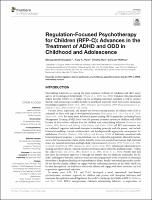Please use this identifier to cite or link to this item:
https://hdl.handle.net/20.500.12202/9913| Title: | Regulation-focused psychotherapy for children (RFP-C): Advances in the treatment of ADHD and ODD in childhood and adolescence. |
| Authors: | Prout, Tracy A. Goodman, Geoff Chung, Hyewon Sherman, Arielle 0000-0002-3650-5890 |
| Keywords: | psychotherapy process process research child psychotherapy psychodynamic psychotherapy Regulation Focused Psychotherapy for Children |
| Issue Date: | 2020 |
| Publisher: | US : Educational Publishing Foundation |
| Citation: | Di Giuseppe, M., Prout, T. A., Rice, T., & Hoffman, L. (2020). Regulation-focused psychotherapy for children (RFP-C): Advances in the treatment of ADHD and ODD in childhood and adolescence. Frontiers in Psychology – Psychopathology. |
| Series/Report no.: | Frontiers in Psychology – Psychopathology; |
| Abstract: | Understanding psychotherapy process provides a pathway toward understanding the mechanisms of change and therapeutic factors in psychodynamic psychotherapy. This study examines psychotherapy process in Regulation Focused Psychotherapy for Children (RFP-C), a manualized and time-limited psychodynamic treatment designed for children with disruptive behavior disorders. Sixty child psychotherapy sessions, from 20 children (13 male, seven female; Mage = 8) diagnosed with oppositional defiant disorder, were coded using the Child Psychotherapy Q-Set. Results indicate that common factors characterized actual sessions of RFP-C to a greater degree than expected, with sessions adhering significantly to the RFP-C, Psychodynamic Therapy, Cognitive-Behavioral Therapy, Child-Centered Play Therapy, and Reflective Function prototypes. Multilevel modeling results suggested a wide range of variability in terms of patient and therapist effects across psychotherapy processes in this child therapy modality. Therapists were more adherent to the cognitive–behavioral prototype when treating children with comorbid attention problems. Adherence to the RFP-C prototype increased over time and multiple regression analyses indicated that adherence to the PDT prototype (β = −.85, p = .024) was predictive of greater symptom reduction. Overall, RFP-C sessions in this study were less adherent to the prototype than expected and psychodynamic psychotherapy process adherence was predictive of symptom improvement. Limitations, directions for future research, and clinical implications are discussed. (PsycInfo Database Record (c) 2022 APA, all rights reserved) •••Impact Statement: This study describes the processes that are most and least characteristic of a manualized, psychodynamic therapy for children who present with disruptive behavior problems. There were many types of psychotherapy processes that were reflective of common factors across many treatment approaches. The types of psychotherapy processes that were used most and least in these sessions varied greatly based on therapist and patient factors. Psychodynamic psychotherapy interventions were predictive of symptom improvement. Overall, these sessions of Regulation Focused Psychotherapy for Children, a manualized psychodynamic treatment, were largely characterized by common factors such as nonjudgment and responsiveness from the therapists, impulsive and non-compliant patients, and child-led sessions characterized by mutual understanding between therapist and patient. (PsycInfo Database Record (c) 2022 APA, all rights reserved) |
| Description: | Research article |
| URI: | https://ezproxy.yu.edu/login?url=https://search.ebscohost.com/login.aspx?direct=true&AuthType=ip,sso&db=pdh&AN=2022-17109-001&site=eds-live&scope=site https://hdl.handle.net/20.500.12202/9913 |
| ISSN: | 1053-0479 (Print) 1573-3696 (Electronic) |
| Appears in Collections: | Ferkauf Graduate School of Psychology: Faculty Publications |
Files in This Item:
| File | Description | Size | Format | |
|---|---|---|---|---|
| Prout 2020 OA Regulation-focused psychotherapy for children.pdf | 132.76 kB | Adobe PDF |  View/Open |
This item is licensed under a Creative Commons License

